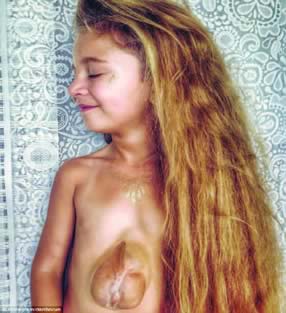Don’t court birth defects through unhealthy habits
Last Wednesday, a Bangladeshi woman was delivered of a set of conjoined twin girls. They have two heads and just one set of vital organs.
In another clime, two girls born with hearts outside their bodies met for playdate. One of them is six-year-old Virsaviya Borun from Russia; while the other child is three-year-old Audrey from the United States. A rare condition caused their hearts to form outside of their chests.
Of course, these are birth defects of monumental category, as they are very rare in larger populations. In fact, both Audrey and Virsaviya were born with a rare condition known as ‘Pantalogy of Cantrell.’ It occurs in about one in one million births!
Physicians and scientists alike agree that many cases of birth defects could sometimes defy medical explanation. However, they offer useful insights into things that could cause birth defects, especially when a foetus is still in the first trimester of a pregnancy.
A General Physician, Dr. Yemisi Akinreti, says birth defects can be minor or severe.
“When defects happen, the baby’s appearance, organ function, and physical or mental development can be affected, depending on which part of the body is involved,” Akinreti explains.
She notes that, unknown to most pregnant women, most birth defects happen within the first three months of pregnancy, when the various organs of the body are just forming. The physician says while some birth defects are harmless, others may require long-term medical attention; while in severe cases, they can lead to the death of an infant.
Common birth defects include Down syndrome, heart defects, cleft lip or palate, spina bifida, and club foot, among others.
Akinreti says a baby’s birth defects affects so many things. “That child may suffer delays in meeting developmental milestones such as the time to sit, crawl or take the first steps.
“The baby may have feeding problems or difficulty in breathing. In some instances, s/he will fail newborn hearing test or suffer seizures as time goes on.
“All these are pointers that physicians look out for when parents complain of certain problems with their infants,” Akinreti explains.
But then, what causes birth defects and how can a pregnant woman prevent her unborn baby from developing one?
Causes of birth defect
In general, researchers say that causes of birth defects are unknown. However, they say that certain events could trigger any birth disorder that an unborn child may develop.
Scientists say certain birth defects can be genetic, while others may be a result of lifestyle choices and behaviours.
Again, they say, the defect could happen when a pregnant woman is exposed to certain medicines and chemicals. In rare instances, the scientists add, a birth defect could be a combination of these factors.
Of course, there are many things that we may not have control over. But we should not hesitate to control events when possible — such as avoiding unethical habits that could lead to lifelong deformities for an unborn baby.
Akinreti says one of the things that could lead to a foetus developing birth defects is when a pregnant mother does not have prenatal attention during pregnancy.
She counsels that immediately a woman suspects that she is pregnant, she should register in any good hospital where her health and that of the developing foetus will be monitored until safe delivery.
“If a woman waits till after the first three months of pregnancy before going to register in the hospital, a lot of damage may be done to the unborn baby, hence the need for early medical attention once a woman suspects she’s pregnant,” the physician says.
Again, gynaecologists warn that certain unhealthy behaviours such as smoking, drug abuse, and alcohol use can seriously influence a foetus to develop birth defects.
Professor of reproductive endocrinology, Oladapo Ashiru, says exposure to environmental toxins or infections also increases a foetus’ risks of birth defects.
And if you are pregnant and diabetic, you may end up having a child with a birth defect if your pregnancy isn’t supervised by a competent physician, says a diabetologist, Dr. Afokoghene Isiavwe.
Smoking in pregnancy
Physicians say this singular habit is capable of multiplying your unborn baby’s risks of developing birth defects.
Experts say the nicotine in cigarette contains more than 4,000 chemicals, including dangerous ones such as cyanide, lead, and at least 60 cancer-causing compounds.
A gynaecologist, Dr. Angela Abiodun, says smoking when pregnant exposes your baby to all these toxic elements that enter into your bloodstream – your baby’s only source of oxygen and nutrients.
“Consequently, the foetus of a smoker-mom risks developing birth defects, ranging from unusually small baby at birth, to lung malfunctioning and brain defects that may result in learning disorders, behavioural problems, and relatively low IQs as time goes on,” Abiodun says.
Prevention through care
Akinreti says when a pregnant woman submits to prenatal care in good hospital, her physician will perform medical tests at crucial stages of the pregnancy in the first, second, and third trimesters.
“Such tests can help the doctor to know the state of the mother’s health and how it can affect her baby’s health.
“Tests to determine the pregnant woman’s blood type, if she has gestational diabetes, anaemia, or other health conditions, level of immunity to certain diseases, exposure to sexually transmitted disease, etc., will help the doctor to prevent birth defects if they are diagnosed and treated early enough,” she says.
The bottom line: Birth defects aren’t always satan’s work; healthy lifestyle and good medical attention can prevent most of them.
PUNCH.








